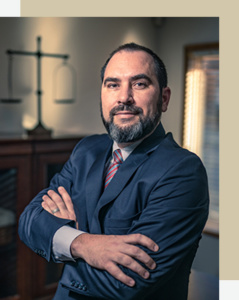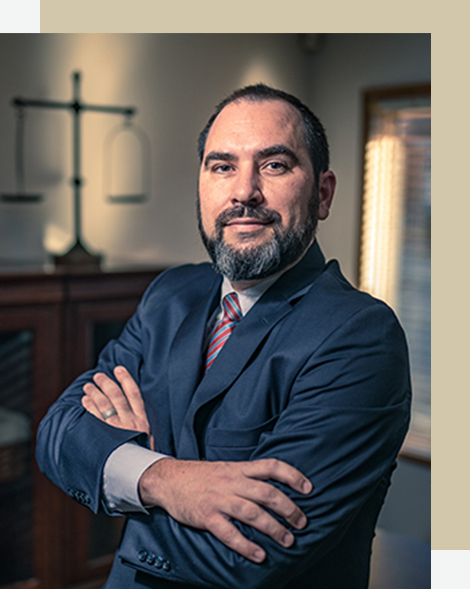Did you or someone close to you recently suffer a concussion? If so, your mind is probably full of questions, including: “How long will these symptoms last?”
Concussion symptoms vary significantly in severity and duration, and the frustratingly vague recovery timeline forms one of many complex factors in your personal injury claim. Our Marion car accident attorneys are committed to your well-being. Get the legal representation you need for your concussion case.
What Is a Concussion?
A concussion is a traumatic brain injury (TBI) that occurs when a sudden blow or jolt to the head disrupts the brain’s normal function. This disruption can result from direct impacts, such as in sports collisions or car crashes, or from rapid back-and-forth movements of the brain within the skull.
Common Concussion Symptoms
Doctors use the term post-concussive syndrome (PCS) to describe physical, cognitive, emotional, and behavioral symptoms that may appear after a concussion.
Common concussion symptoms include:
Physical Symptoms
- Headache
- Blurred or double vision
- Dizziness
- Nausea or vomiting
- Sensitivity to light or noise
- Seizures
- Fatigue or drowsiness
- Balance problems
- Sleep disturbances
- Muscle weakness
- Poor coordination
Cognitive Symptoms
- Loss of consciousness
- Memory problems or amnesia
- Difficulty concentrating or focusing
- Confusion or feeling in a fog
- Slowed thinking or feeling dazed
- Difficulty recognizing familiar people or places
Emotional Symptoms
- Irritability
- Intense emotional reactions
- Mood swings
- Depression or feelings of hopelessness
- Anxiety or nervousness
Behavioral Symptoms
- Engaging in risky behaviors
- Reduced interest in social interactions or activities
- Avoiding friends or family
- Neglecting grooming or personal cleanliness
- Clumsiness or lack of coordination
- Repetitive movements or tics
Sensory Symptoms
- Altered taste or smell
- Blurred or double vision
- Seeing stars or flashing lights
- Difficulties with visual focus or tracking
- Tinnitus (ringing in the ears)
- Loss of sensation or hypersensitivity
- Tingling or numbness
How Long Do Concussion Symptoms Last?
It depends. About 90 percent of PCS symptoms resolve quickly. Most patients’ symptoms diminish or disappear within 10 to 14 days post-injury, but some linger for weeks or years.
The most intense phase of PCS symptoms and related disabilities typically occurs within the initial week following the injury. Recurrent head traumas and the initial severity of the symptoms can cause PCS symptoms to last longer than a month. Most patients recover by the three-month mark.
What Is Persistent Post-Concussive Syndrome?
Persistent post-concussive syndrome occurs when PCS symptoms last longer than three months. While most concussion patients recover swiftly, about 10 to 15 percent experience persistent PCS lasting several months to a year.
A small percentage of this group experiences severe symptoms that require additional medical evaluation and treatment. Some patients with persistent PCS report symptoms becoming even more debilitating over time. And research finds prevalent emotional difficulties among these patients.
What Is Second-Impact Syndrome?
Second-impact syndrome (SIS) is a potentially life-threatening condition that occurs when an individual, still recovering from an initial concussion, sustains a second head injury.
This subsequent trauma, even mild trauma, can lead to rapid and severe brain swelling. The danger of SIS lies in its potential to cause catastrophic neurological harm, including permanent disability, or even death.
SIS can significantly increase the recovery timeline for a concussion. SIS is a severe health issue on its own and disrupts and delays the brain’s healing process from the initial concussion. This second injury makes it harder for the brain to recover, often leading to prolonged and more intense symptoms.
How Much Is My Concussion Injury Case Worth?
The duration of your concussion symptoms may correlate with the potential value of your case. Generally, the longer your symptoms persist, the greater the overall effect on your life, which can justify a higher compensation claim.
Prolonged symptoms typically mean more medical treatments, longer periods away from work, and more considerable changes in overall quality of life. If your symptoms last for months or even years, you might also face challenges with long-term cognitive functions, leading to lost earning potential, lifestyle changes, and emotional distress. All of these factors could substantially increase your case’s value.
Depending on the circumstances, your concussion injury claim could recover compensation for:
- Past and future medical treatment costs
- Incidental out-of-pocket expenses
- Lost income from time away from work
- Losses in lifetime earning capacity
- Pain and suffering
- Loss of quality of life
How to Prove a Concussion in an Injury Case
If you intend to seek compensation in a concussion injury case, you’ll need solid evidence to demonstrate the extent of your injury and prove who is liable.
A seasoned attorney can gather and present helpful evidence for your case, such as:
- Medical records detailing the injury
- CT scans or MRIs showing brain abnormalities
- Video footage of the incident that caused the injury
- Photographs of the accident scene
- Witness statements
- Police or incident reports
- Records of post-injury medical appointments
- Physical therapy records
- Diary or journal entries documenting daily symptoms
- Employment records showing missed workdays
- Expert testimonies (e.g., from neurologists)
- Financial records showing medical expenses
- Documentation of any assistive devices you need post-injury
- Testimonies from family or friends about your post-accident condition
- Any prior medical records to demonstrate pre-injury health
How a Lawyer Can Help with Your Concussion Injury Case

After a concussion, protect your rights and maximize the value of your injury case by working with a knowledgeable Marion personal injury lawyer near you.
A lawyer can help you by:
- Investigating the circumstances surrounding the incident
- Gathering and preserving vital evidence
- Consulting medical experts to understand the severity of your injury
- Identifying all possible sources of compensation
- Calculating the total damages, including future medical costs
- Interviewing witnesses and recording witness statements
- Collaborating with accident reconstruction experts
- Drafting and submitting demand letters to liable parties
- Negotiating with insurance companies on your behalf
- Challenging claim denials or low settlement offers
- Preparing a compelling case for court, if necessary
- Filing necessary paperwork within legal deadlines
- Representing you in any legal proceedings
